- SRM University-AP Honoured Faculty Members for their Exemplary Excellence in the Field of Education September 25, 2024
The Hans India
Continue reading →
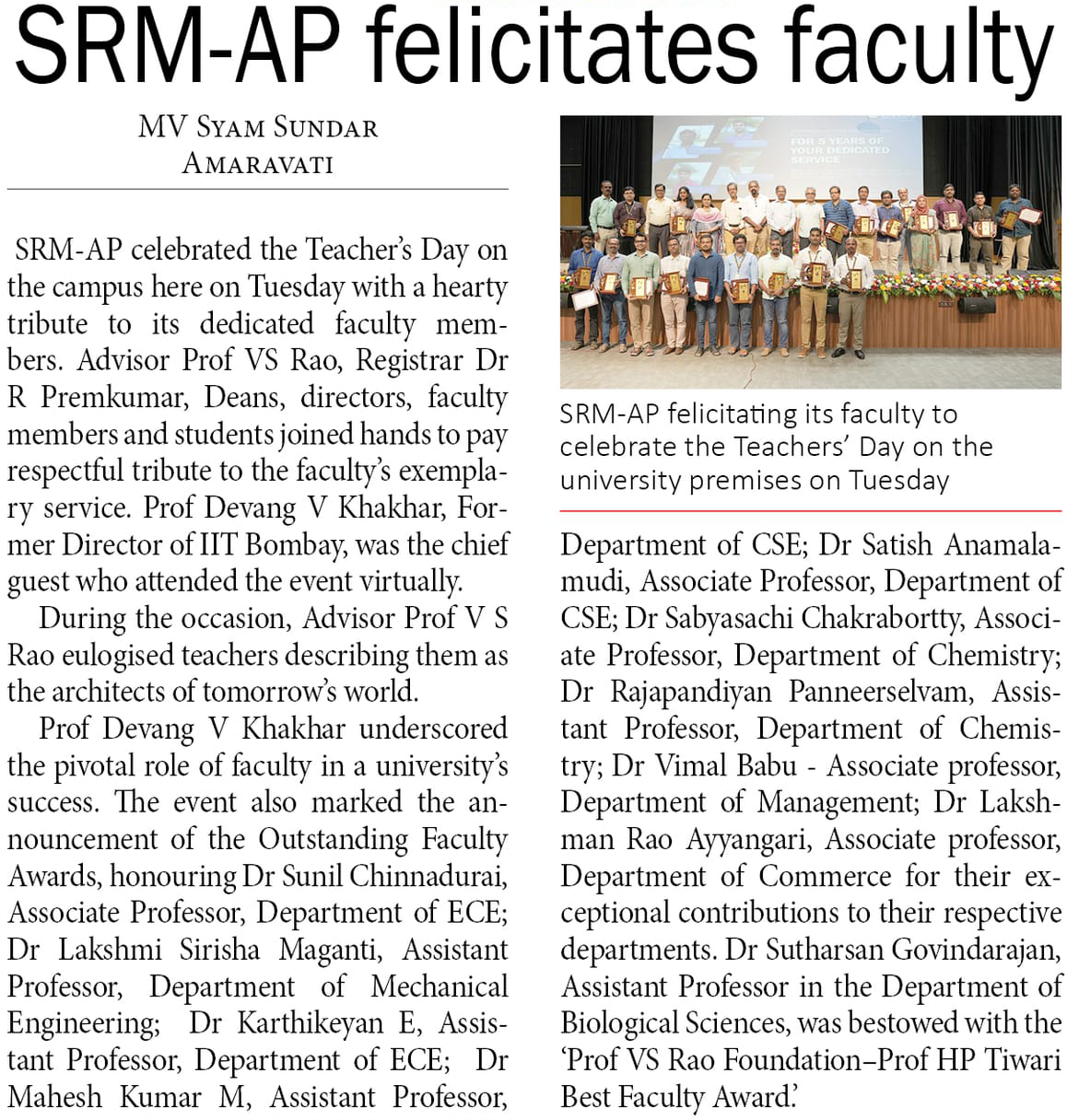
The Pioneer
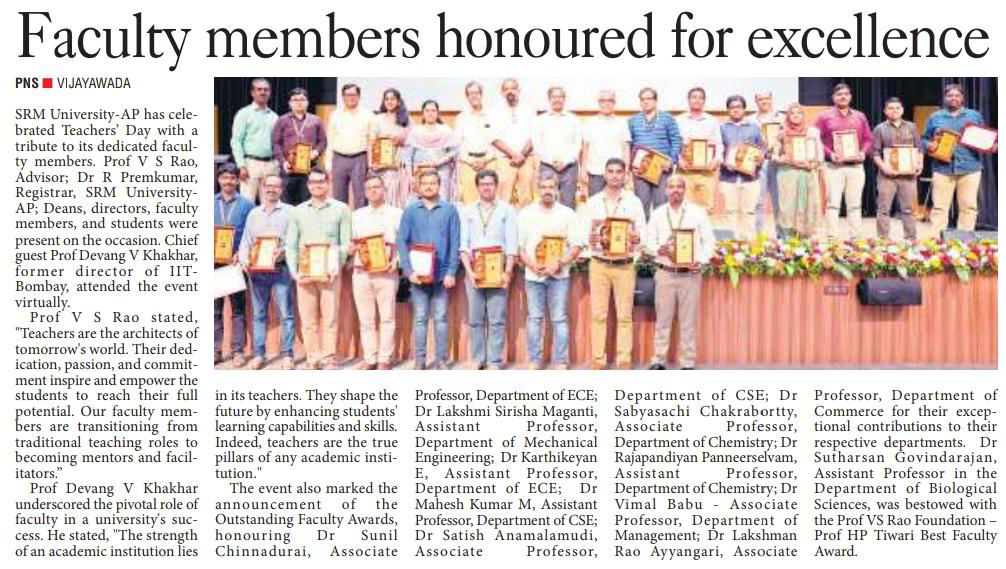
Newsvoir
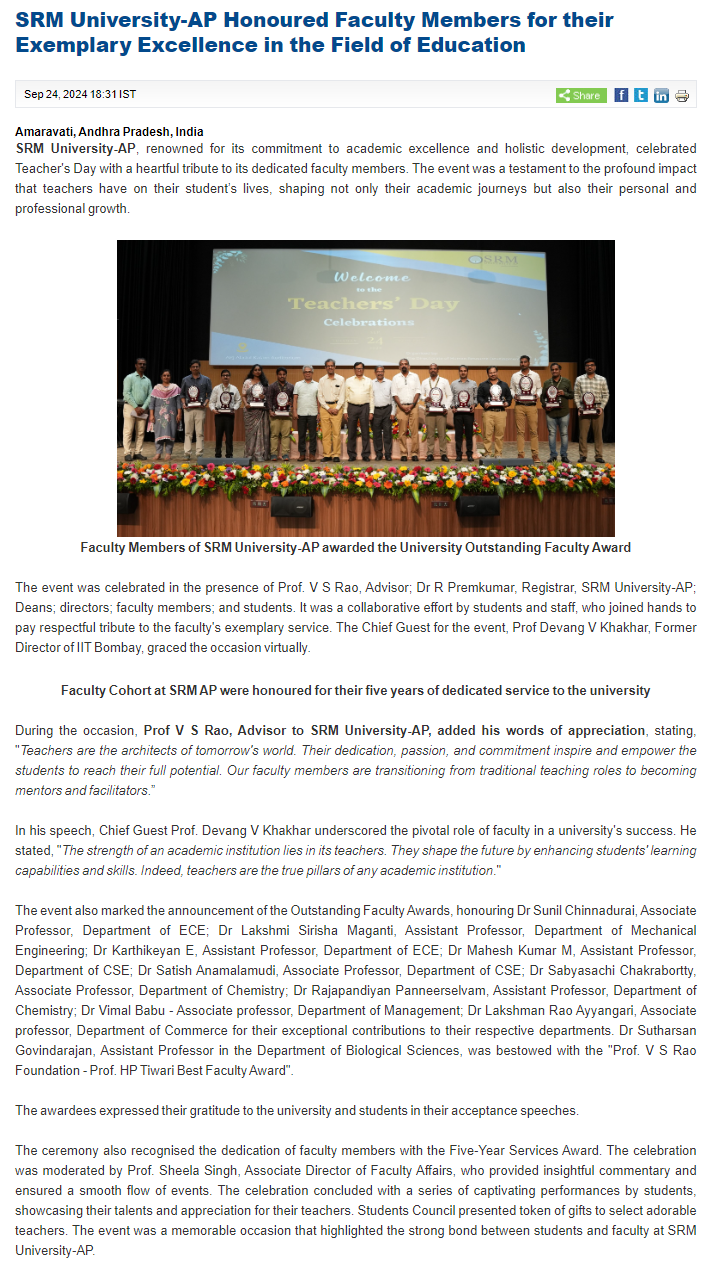
Eenadu
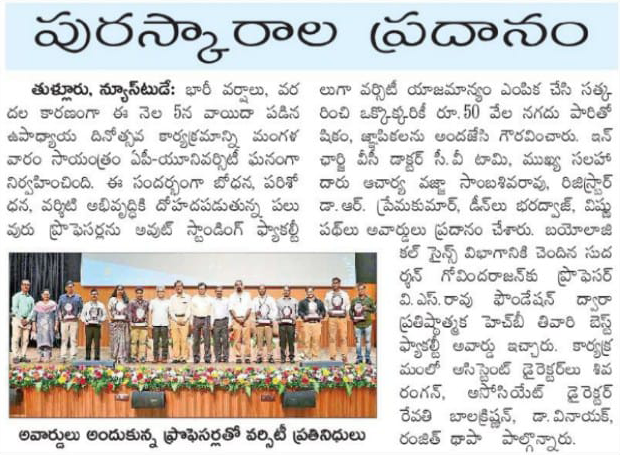
Surya
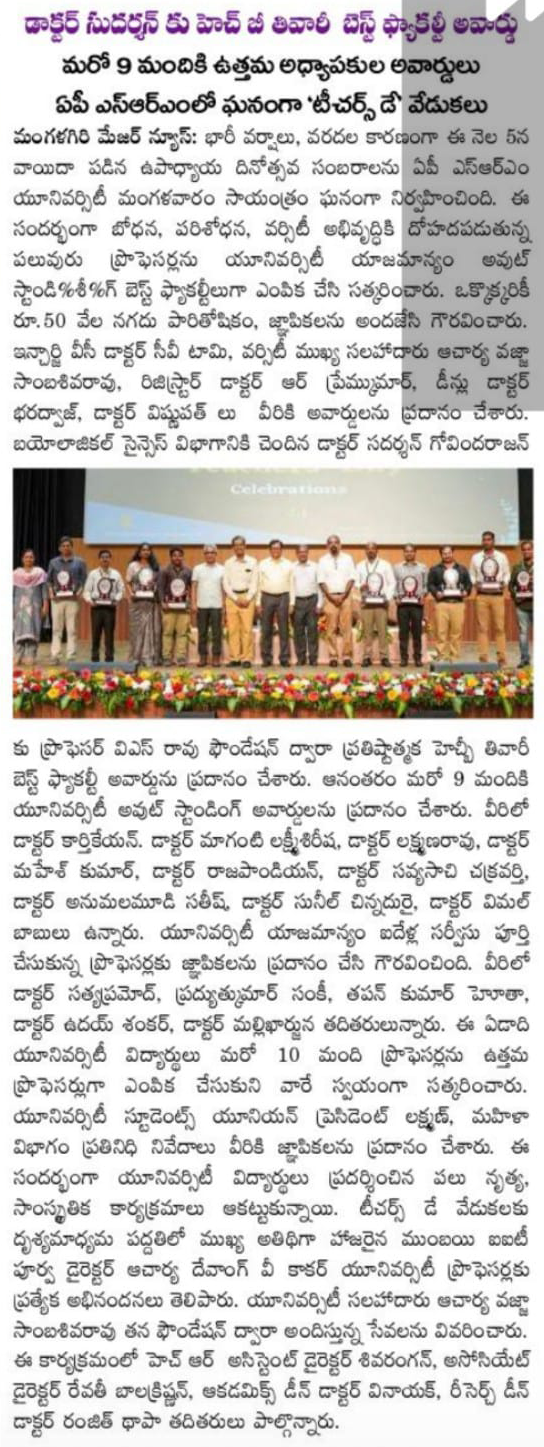
Andhra Patrika
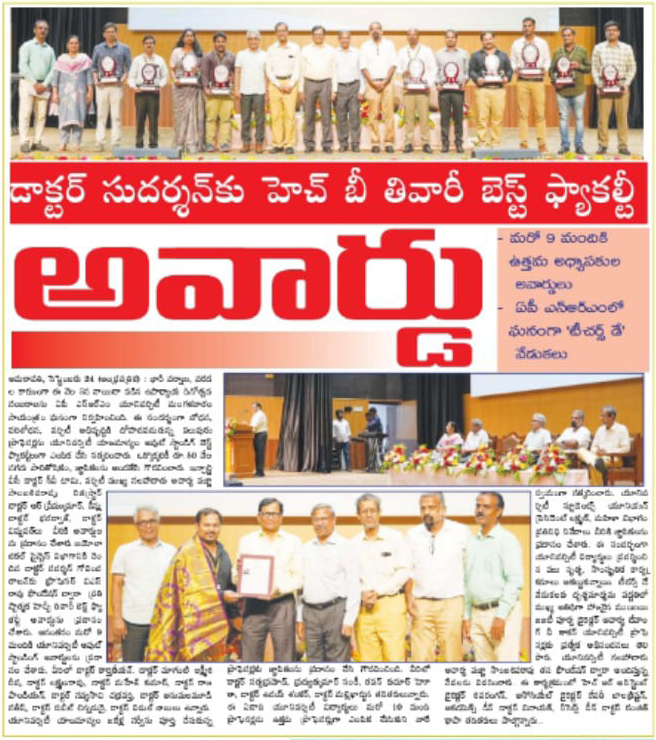
Vartha
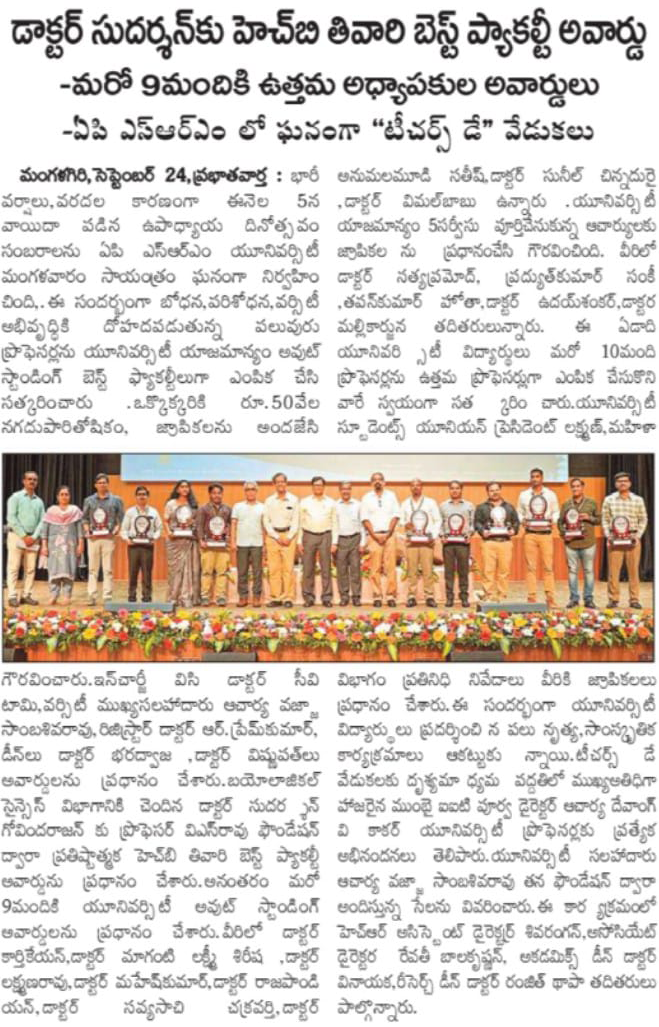
Andhra Prabha
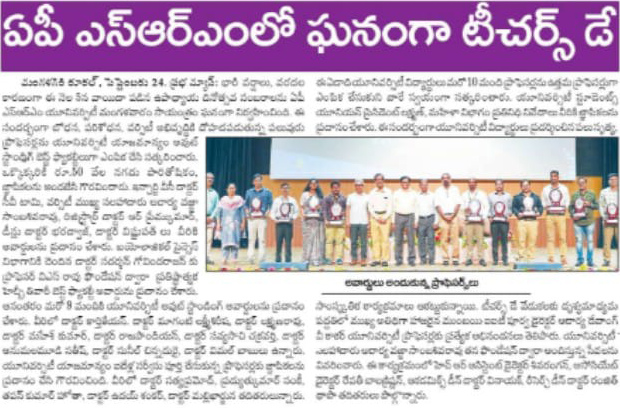
Prajasakthi
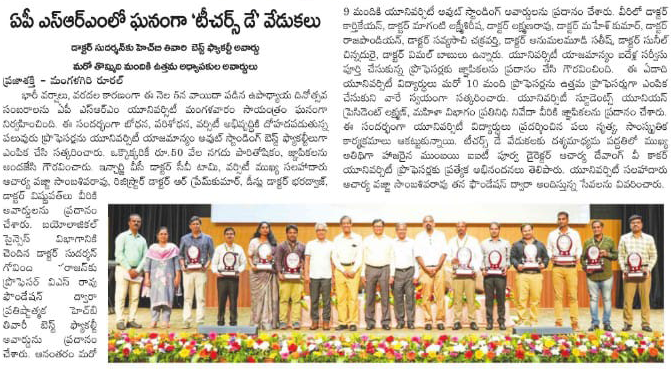
- Dr Rupesh Kumar Secures Major Research Grant for Amazon Forest Canopy Mapping Project September 24, 2024
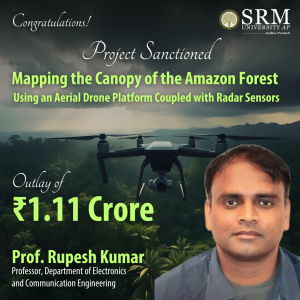 In a groundbreaking development, Dr Rupesh Kumar, a Professor in the Department of Electronics and Communication Engineering, has been awarded a significant project titled “Mapping the Canopy of the Amazon Forest Using an Aerial Drone Platform Coupled with Radar Sensors.” The initiative, funded by the International Peruvian National Research Institute, boasts an impressive outlay of Rs. 1.11 Crores and is set to span over a two-year period.
In a groundbreaking development, Dr Rupesh Kumar, a Professor in the Department of Electronics and Communication Engineering, has been awarded a significant project titled “Mapping the Canopy of the Amazon Forest Using an Aerial Drone Platform Coupled with Radar Sensors.” The initiative, funded by the International Peruvian National Research Institute, boasts an impressive outlay of Rs. 1.11 Crores and is set to span over a two-year period.The project is spearheaded by Principal Investigator Dr Mark Donny Clemente Arenas, an Associate Professor at the National Technological University of South Lima in Peru. This collaboration aims to enhance the understanding of the Amazon’s intricate canopy structure and promote conservation efforts through innovative technology.
In recognition of this notable achievement, SRM University-AP proudly congratulated Dr Kumar and highlighted the significant impact this project could have on environmental research and sustainability. The university’s support underscores its commitment to fostering research initiatives that address global challenges, encouraging faculty members to pursue innovative solutions through collaboration and the application of cutting-edge technology.
This initiative marks a significant milestone in international research collaboration, leveraging technology to address critical environmental challenges in one of the world’s most vital ecosystems.
A Brief Description of the Project
This project facilitates the mapping of the Amazon forest in Peru. An integrated approach of advanced sensors such as LiDAR, Millimeter-Wave Radar, Camera, etc. and UAV will achieve this.
This will help assess the Amazon forest’s health in real time by leveraging the ML/AI approaches.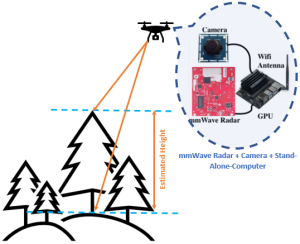
Figure 1: Scheme for height estimation
Explanation of the Research in Layperson’s Terms
The plant/tree generally reflects radio waves and other signals, and this reflection depends on the density of the forest. If a suitable signal processing is applied to the reflected signals, it will provide insight information about the forest profile. Nevertheless, this will help in the quantification of land covered by trees, identifying the location of those trees. Consequently, the tree canopy assessments help in determining the amount and location of impervious cover.
Funding Agency and Amount Sanctioned
National Scientific Research and Advanced Studies Program (PROCIENCIA) of the National Council for Science, Technology and Technological Innovation (CONCYTEC), Peru.
In Spanish: “ Programa Nacional de Investigación Cientifica y Estudios Avanzados (PROCIENCIA), del Consejo Nacional de Ciencia, Tecnología e Innovación
Tecnológica (CONCYTEC), Perú”.Practical Implementation of the Research or the Social Implications Associated with it
The proposed research work help will help in the assessment of deforestation as well as its impact on climate change and global warming. Not only this, but the research will also contribute to achieving carbon neutrality by 2050!
Collaborations
Universidad Nacional Tecnológica de Lima Sur
Collaborator: Prof. Mark Clement ArenasFuture Research Plans
In future, this work will be extended for infrastructure monitoring. With the boom in real estate, a continuous monitoring system is desired for proper maintenance.
Continue reading → - Dr Jaidev Kaushik’s Publishes New Publication on Graphene Incorporated Aerogels September 24, 2024
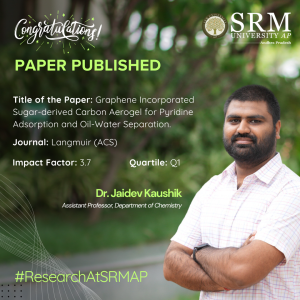 Dr Jaidev Kaushik, an Assistant Professor in the Department of Chemistry, has recently published a pioneering research paper in the prestigious journal Langmuir (ACS). The paper, titled “Graphene Incorporated Sugar-derived Carbon Aerogel for Pyridine Adsorption and Oil-Water Separation,” explores innovative applications of graphene-based materials.
Dr Jaidev Kaushik, an Assistant Professor in the Department of Chemistry, has recently published a pioneering research paper in the prestigious journal Langmuir (ACS). The paper, titled “Graphene Incorporated Sugar-derived Carbon Aerogel for Pyridine Adsorption and Oil-Water Separation,” explores innovative applications of graphene-based materials.Dr Kaushik’s research focuses on the development of a novel carbon aerogel derived from sugar and incorporated with graphene. This material demonstrates exceptional efficiency in adsorbing pyridine, a harmful organic compound, and effectively separating oil from water. These findings hold significant promise for environmental remediation and industrial applications, offering a sustainable solution to pollution and waste management challenges.
The publication of this paper in Langmuir highlights the cutting-edge research being conducted at SRM University-AP and underscores Dr Kaushik’s contributions to the field of chemistry. His work not only advances scientific understanding but also paves the way for practical applications that can benefit society at large.
Abstract
In this report, we have synthesized three-dimensional and hydrophobic graphene-incorporated carbon aerogel (G-SCA) derived from sugar. G-SCA is being used as a multifunctional sorbent material for removing various advanced water soluble and insoluble pollutants Initially, G-SCA is being explored for the adsorption of nitrophenols, nitroaromatics (3-nitroaniline), insecticide (Phoskill), antibiotic (ciprofloxacin), and pharmaceutical drug precursor (pyridine). Later, same G-SCA is also explored in the absorption of various protic and aprotic organic solvents and oils (including crude oil, waste cooking oil, and waste Mobil oil), with excellent recyclability checked up to 10 cycles. Moreover, oil-water separation experiments are also being done in various industrial wastewater samples and seawater to support the real-life accessibility of present approach. Large-scale applicability of G-SCA is also checked by performing crude oil-seawater separation experiments using a laboratory-scale prototype demonstrating the successful continuous recovery of crude oil.
Explanation of The Research in Layperson’s Terms
This research demonstrates the synthesis of carbon aerogel from edible sugar followed by the incorporation of graphene oxide to make a near superhydrophobic and good water-floating sorbent material. Later, this sorbent material was used to decontaminate wastewater from advanced pollutants such as explosive wastes, expired antibiotics, pharmaceutical waste, insecticides, etc. This report also showed the practical demonstration of crude oil recovery from seawater, thus contributing to the circular economy process.
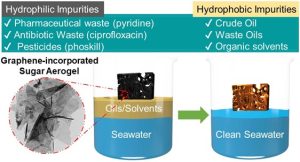
Title of Research Paper in the Citation Format
F. Agrawal, K. Gupta, J. Kaushik, K. M. Tripathi, S. K. Choudhary, S. K. Sonkar, Graphene Incorporated Sugar Derived Carbon Aerogel for Pyridine Adsorption and Oil–Water Separation, Langmuir 2024, 40, 18028–18038.
Practical Implementation or the Social Implications Associated with the Research
This work describes the synthesis of low-cost near superhydrophobic carbon aerogel, displaying its multiple applications in wastewater treatment from water-soluble and water-insoluble pollutants. It is also an alternative and cost-effective approach for recovering valuable oil and organic compounds from water rather than degrading or destroying them so they can be reused.
Collaborations
Dr Sumit Kumar Sonkar (MNIT Jaipur, India)
Future Research Plans
1. The adsorption/photodegradation-assisted quick and efficient removal of next generation advanced pollutants such as microplastic, pesticides, pharmaceutical waste, etc. by hydrophobic carbon aerogel and their doped and functionalised versions.
Continue reading →
2. Utilizing waste derived heterogeneous catalysts in organic transformation reactions.
3. Selective sensing of toxic metal ions/biomarkers/biomolecules using fluorescent nanomaterials.
4. Upcycling of carbonates/CO2 via photo/thermal assisted reactions to get C1 and C2 hydrocarbons (green fuel). - Unveiling Innovations: Dr Ghosh Publishes Findings on 300 GHz Communication Links September 24, 2024
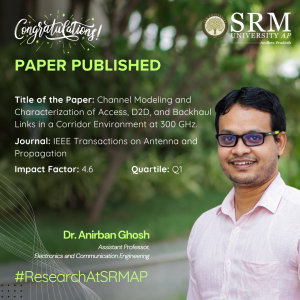 Dr Anirban Ghosh, an esteemed Assistant Professor in the Department of Electronics and Communication Engineering, has recently published a significant research paper titled “Channel Modeling and Characterization of Access, D2D, and Backhaul Links in a Corridor Environment at 300 GHz.” This paper has been featured in the prestigious Q1 Journal, IEEE Transactions on Antenna and Propagation, with an impressive impact factor of 4.6.
Dr Anirban Ghosh, an esteemed Assistant Professor in the Department of Electronics and Communication Engineering, has recently published a significant research paper titled “Channel Modeling and Characterization of Access, D2D, and Backhaul Links in a Corridor Environment at 300 GHz.” This paper has been featured in the prestigious Q1 Journal, IEEE Transactions on Antenna and Propagation, with an impressive impact factor of 4.6.
Dr Ghosh’s research delves into the intricate aspects of channel modelling and characterisation, focusing on access, device-to-device (D2D), and backhaul links within a corridor environment at a high frequency of 300 GHz. This study is poised to make substantial contributions to the field of wireless communication, particularly in enhancing the understanding and development of next-generation communication systems.
The publication in such a renowned journal underscores the quality and impact of Dr. Ghosh’s work, reflecting the cutting-edge research being conducted at SRM University – AP. The university community extends its heartfelt congratulations to Dr. Ghosh for this remarkable achievement and looks forward to his continued contributions to the field of electronics and communication engineering.Abstract:
This paper presents comprehensive double-directional channel measurements at 300 GHz across various corridor scenarios, including Access, Device-to-Device (D2D), and Backhaul, using an in-house developed channel sounder. The measurements, validated by ray tracing simulations, reveal that while 300 GHz quasi-optical propagation in corridors can be modeled using ray optics, non-trivial propagation phenomena, such as quadruple-bounce reflections, also occur. To accurately model these mechanisms, a quasi-deterministic (QD) channel model combining deterministic and random components is proposed. The QD model results align well with observations, highlighting similar propagation mechanisms for Access and D2D scenarios, while Backhaul scenarios show Line-of-Sight (LoS) impacts from ceiling reflections. These findings are crucial for designing next-generation THz communication systems.
Explanation of Research in Layperson’s Terms
This research contributes to building the next generation of communication networks, which will significantly impact society by improving connectivity, supporting technological advancements, and promoting economic development, and bringing forth several futuristic applications.
Practical Implementation
The results align with the design of high-frequency ultra-high speed, low-latency, reliable communication envisioned for several futuristic applications using beyond 5G and 6G networks.

The measurement scenarios explored in the paper.
Collaborations
Prof. Minseok Kim
Professor, Faculty of Engineering, Course of Electrical and Electronics Engineering
Niigata University, Japan.
e-mail: mskim@eng.niigata-u.ac.jpFuture Research Plans
The efforts would be extended to other communication scenarios for a similar study. Additionally, generating appropriate channel models, coverage design, link budget, etc for the explored and unexplored scenarios would also encompass an interesting study.
Continue reading → - Your Guide to Mastering Money with BSc Economics September 20, 2024

As you navigate through subjects like Biological Psychology, Social Psychology, and Cognitive Psychology, you’ll gain profound insights into the intricacies of the human psyche. But the allure of a BSc in Psychology extends far beyond the classroom.
With the demand for clinical and counselling psychologists projected to surge by 11% by 2032, this degree opens doors to a multitude of fulfilling career pathways. Whether you aspire to guide individuals through life’s challenges as a clinical psychologist or provide empathetic support as a counselling psychologist, the opportunities are boundless.
You can join this extraordinary academic odyssey, where you’ll not only expand your intellectual horizons with BSc Psychology subjects but also embark on a rewarding journey of personal and professional growth.
BSc Psychology Subjects Lists
Here’s a list of common subjects typically included in a BSc Psychology programme:
Introduction to Psychology
Biological Psychology
Cognitive Psychology
Developmental Psychology
Social Psychology
Abnormal Psychology
Personality Psychology
Statistics for Psychology
Research Methods in Psychology
Psychological Testing and Assessment
Clinical Psychology
Counselling Psychology
Industrial-Organisational Psychology
Health Psychology
Forensic Psychology
Cross-Cultural Psychology
Neuropsychology
Educational Psychology
Positive Psychology
Environmental Psychology
Keep in mind that the specific subjects offered may vary depending on the university and the curriculum structure of the BSc Psychology programme.
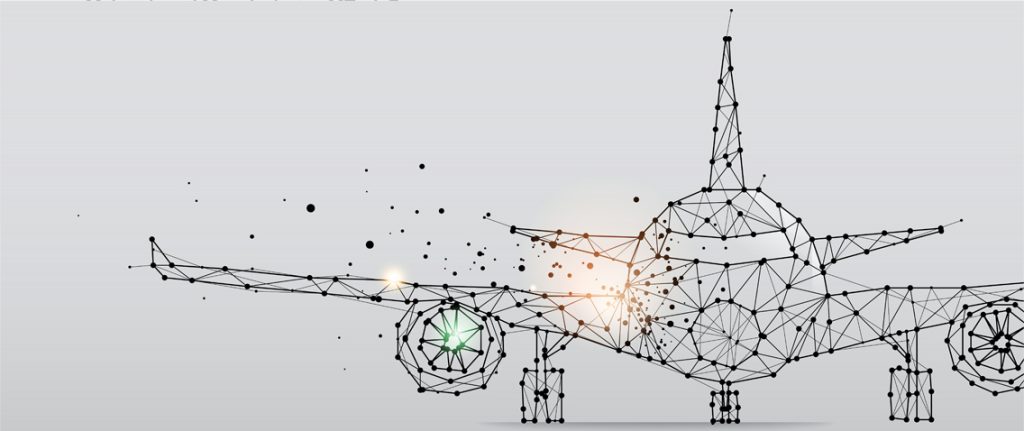
BSc Psychology Syllabus
Given below is the year-wise subject and syllabus of BSc Psychology:
Graduates with a Materials and Manufacturing MTech degree can access rewarding and well-paying positions in areas such as,
-
- Aerospace engineering
- Automotive engineering
- Biomedical engineering
– that require expertise in materials and manufacturing technology.
The practical knowledge gained from Materials and Manufacturing MTech studies can help develop new materials for use in production pipelines or create innovative manufacturing processes that streamline production times whilst improving quality control, making the Materials and Manufacturing MTech degree beneficial to the individual graduate and employers alike.
- Surplus Opportunities to Work on Research Projects
Pursuing an MTech degree provides opportunities to work on research projects, which can create networking opportunities and help you hone your skills.
For example, Thermal MTech students get to explore the fascinating field of Thermal engineering, such as Thermal design and Thermal analysis.
They also get to work on projects related to,
-
- Thermal energy management
- Thermal systems design
- Thermal control systems.
- The Bright Side of Thermal Engineering
Working on research projects in Thermal engineering can also give students an edge in the industry as it enhances their understanding of Thermal principles and technologies.
Valuable industry experience and essential connections in the Thermal engineering field through their research work.
All these advantages make pursuing an MTech degree worthwhile for those interested in Thermal engineering.
MTech provides invaluable insight into the latest breakthroughs and technologies in your field, helping you stay ahead of the curve.
Studying for an MTech can provide immense advantages for those in the technological field, particularly IoT technologies. Not only does it offer the opportunity to gain higher qualifications and broaden skills, but it can also provide invaluable insight into the latest IoT breakthroughs and technologies, helping students stay ahead of the curve.
- The Perks of an MTech in VLSI
An MTech in VLSI will allow you to develop advanced knowledge and skills, making a VLSI engineer highly sought after in many industries. As a VLSI engineer, you can work with hardware design, device fabrication, circuit design and debugging, amongst other skills, which will give you a competitive edge over other job applicants.
- Possibilities of the Internet of Things (IoT)

IoT (Internet of Things) related coursework provides students with comprehensive technical and practical insight into IoT systems development. Technical topics like IoT architecture, IoT standards and IoT security are taught in detail, enabling those who complete the program to gain specialised knowledge in the IoT domain.
Furthermore, the programme also typically offers a research-based thesis which enables students to apply their IOT skills to real-world problems. In this way, MTech programmes provide an excellent opportunity for students to understand IoT systems and technologies deeply.
What to Expect From an MTech Degree?
-
- Opportunity to develop their professional skills through hands-on projects and internships
- Opportunity to become experts in Data Science and its associated technologies.
- Data Science is a rapidly evolving field, and an MTech will provide the guidance needed to stay current and be at the forefront of Data Science development.
- Provides students with the ability to gain a deeper understanding of Data Science and its applications, which can help them get better jobs or progress their careers.
Where Will You Be After graduation?
Upon graduation, MTech graduates are highly sought after in the job market, with many top companies offering competitive salaries for those with an MTech degree.
Furthermore, an MTech degree is a tremendous advantage as Thermal graduates are highly sought after in the job market.
Thermal graduates have specialised knowledge, making them more attractive to companies and often offered competitive salaries.
An MTech degree provides Thermal graduates with unique skills and qualifications that make them stand out in the job market and ensure they have a competitive advantage over other applicants.
Making the Most of Your MTech Degree; Yes That’s What Makes the difference!
With an MTech degree, you can pursue a plethora of career options.
What are the Most Coveted Career Options After MTech?
-
-
- Engineering
- Research and development
- Data science
- Materials and Manufacturing
-
- The Scope of Materials and Manufacturing
Materials and Manufacturing are two areas often explored in an MTech course.
-
-
- Provide you with knowledge of materials used in industries and hands-on experience working with them.
- Access to other related fields, such as chemical engineering and robotics.
- Enable you to develop expertise in manufacturing processes, including production planning, cost control and product design.
- On completing the degree, you can embark on a career as a Materials and Manufacturing Engineer with high growth prospects.
- Exclusive job opportunities in the government sector.
-
- The Future of MTech in VLSI
MTech in VLSI empowers students to get VLSI-related roles in the government and even industries like Aerospace, Medical electronics, Automotive industry, etc.
VLSI has become a popular technology due to its versatility in processing large amounts of data without lags. With the proper knowledge and specialised skillset gained through the course, you will be able to face the challenges of a competitive job market more confidently.
What is Stopping You From Grabbing That MTech Degree!
Pursuing an MTech degree can be a rewarding experience. It is an opportunity to gain the skills and knowledge needed to pursue specialised careers in your field of study.
With a vast range of opportunities that come with gaining an MTech degree, it is worth considering if you’re looking for specialised training and education.
With hard work and dedication, you can find great success in your chosen career after completing your MTech degree!
You are just a click away from pursuing your dream MTech Degree!
Continue reading → -

